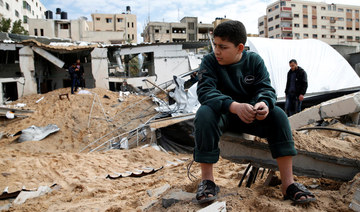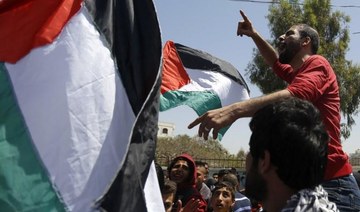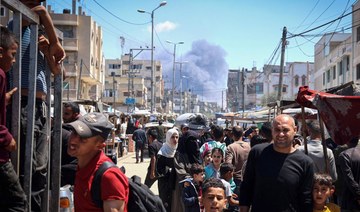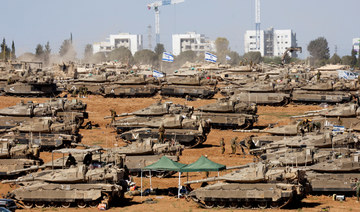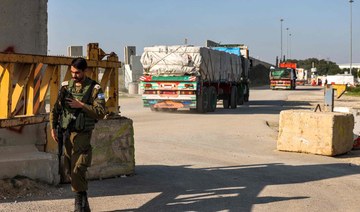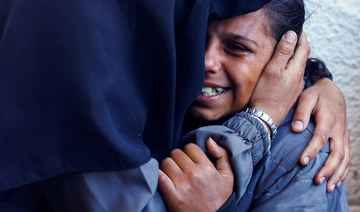GAZA CITY: Hamas is facing the biggest demonstrations yet against its 12-year rule of the Gaza Strip, with hundreds of Palestinians taking to the streets in recent days to protest the dire living conditions in the blockaded territory.
With little tolerance for dissent, the militant group has responded with heavy-handed tactics. It has arrested dozens of protesters, beaten activists and violently suppressed attempts by local media to cover the unrest.
Hamas has accused the rival West Bank-based Palestinian Authority of orchestrating the protests — a charge that organizers vehemently reject.
“There is no political agenda at all,” said Amin Abed, 30, an organizer who has been forced into hiding. “We simply want to live in dignity,” he said by telephone. “We just ask Hamas to ease the economic hardships and tax burdens.”
Hamas seized control of Gaza in 2007 from the forces of Palestinian President Mahmoud Abbas. Israel and Egypt imposed a blockade, a step meant to prevent Hamas from arming.
The blockade, and three wars with Israel, have ravaged Gaza’s economy but done nothing to loosen Hamas’ grip on power.
Unemployment is over 50 percent and much higher for young university graduates like Abed. Tap water is undrinkable, electricity is limited and travel abroad severely restricted. Hamas’ cash-strapped government recently raised taxes on basic goods like bread, beans and cigarettes.
Protesters accuse Hamas of corruption and imposing the hefty taxes to enrich itself. They used social media to organize protests last week with the slogan “We want to live!”
The protests come just as Hamas marks the one-year anniversary of its weekly demonstrations along the frontier with Israel. The demonstrations, aimed largely at easing the blockade, have accomplished little, even as some 190 Palestinians have been killed and thousands wounded by Israeli fire.
This is not the first time people have taken to the streets against Hamas. Two years ago, protesters demonstrated against the chronic power cuts on a cold January day before Hamas violently dispersed them. This time around, the sporadic rallies have continued for five days, despite a similarly violent response.
“These protests were the largest, the longest and the most violent in terms of Hamas’ suppression,” said Mkhaimar Abusada, political science professor at Gaza’s Al-Azhar University.
“This was a message of anger to Hamas that the situation is unbearable and that it must reconsider all its policies,” he added.
On Monday, Amnesty International reported that hundreds of protesters have been beaten, arbitrarily arrested, tortured and subjected to ill-treatment. Journalists and human rights workers, including a researcher for the London-based organization, were also roughed up, Amnesty said.
“The crackdown on freedom of expression and the use of torture in Gaza has reached alarming new levels,” said Amnesty’s Middle East deputy director Saleh Higazi.
Osama Al-Kahlout, a journalist with the local news site Donia Al-Wattan, last week published a photo of a protester on crutches raising a sign that said “I want to live in dignity.” The next day, he was detained as he went live on Facebook during another protest.
Al-Kahlout said police smashed furniture, seized his belongings and beat him on the way to the police station. “I’m a journalist,” he said. “I don’t regret covering it.”
He said he was released after a meeting with the police chief in which officials “advised” journalists not to cover the protests.
Heba el-Buhissi, 31, who filmed the raids at her family home, said a policeman fired a warning shot in the air as others cursed and yelled at her after she started filming. Her videos show a group of Hamas police beating her cousin with wooden batons.
Other amateur videos have shown protesters burning tires and hurling stones toward Hamas forces. Hamas gunmen can be seen jumping out of vehicles and beating people with clubs. Other videos show Hamas going door to door and carrying out mass arrests.
El-Buhissi filmed the incident last Thursday when she saw Hamas dispersing some of her neighbors who had hoisted banners against tax hikes. Her family opened the home to allow youths to escape the police.
“This is what drove the police crazy, and that’s why they stormed our houses,” she said. “I felt I have to film to prove what was going on.”
The Brussels-based International Federation of Journalists reported Monday that 42 Palestinian journalists “were targeted” by Hamas forces in the past five days. The abuses included physical assaults, summons, threats, home arrests and seizure of equipment.
The official Palestinian Authority news agency Wafa reported Monday that the spokesman of Abbas’ Fatah movement in Gaza, Atef Abu Saif, was badly beaten by Hamas.
It showed pictures of Abu Said with a bandaged leg, bruises and blood-stained clothes lying on a hospital bed.
Ammar Dwaik, director of the Independent Commission for Human Rights in Gaza, said Hamas forces have dispersed 25 protests with excessive force and arrested about 1,000 people. He said some 300 people remain in custody.
“This is worst crackdown in Gaza since the Hamas takeover in 2007 in terms of its scope and cruelty,” Dwaik said.
On Tuesday, Hamas issued a brief statement “rejecting the use of violence and repression against any Palestinian for practicing his legitimate right of expression.”
But Sami Abu Zuhri, a Hamas official, used tougher language in a Twitter post, accusing Israel and the Palestinian Authority of conspiring to organize protests. “The attempts of the Palestinian Authority and the occupation to drive a wedge between the people and the resistance have failed,” he said.
The demonstrations appeared to subside on Monday, but organizers say the protests will continue until Hamas cancels taxes on dozens of goods, creates a national employment program and releases everyone who has been arrested in the crackdown.
Abed, the protest leader, said Hamas has stormed his family’s house and delivered an arrest warrant for him to his father.
“Hamas doesn’t want us to scream. It wants us to die in silence,” he said.
Rare protests erupt against Hamas’ 12-year rule over Gaza
Rare protests erupt against Hamas’ 12-year rule over Gaza
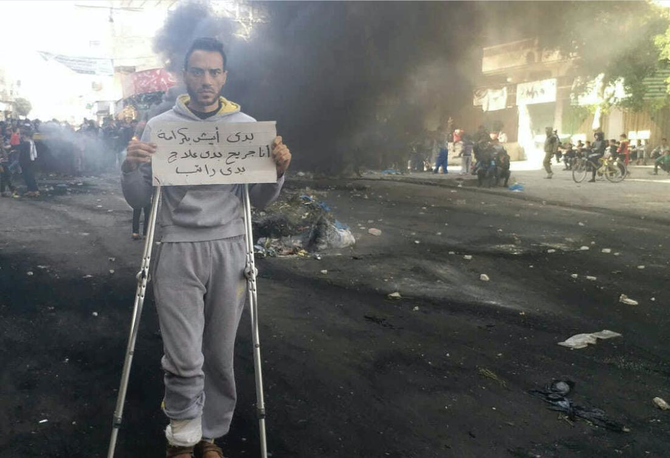
- Unemployment is over 50 percent and much higher for young university graduates
- Tap water is undrinkable, electricity is limited and travel abroad severely restricted
South Gaza hospitals have only three days’ fuel left: WHO

Despite international objections, Israel sent tanks into the overcrowded southern city of Rafah on Tuesday and seized the nearby crossing into Egypt that is the main conduit for aid into the besieged Palestinian territory.
“The closure of the border crossing continues to prevent the UN from bringing fuel. Without fuel all humanitarian operations will stop. Border closures are also impeding delivery of humanitarian aid into Gaza,” WHO Director General Tedros Adhanom Ghebreyesus said on X, formerly Twitter.
“Hospitals in the south of Gaza only have three days of fuel left, which means services may soon come to a halt.”
Tedros said Al-Najjar, one of the three hospitals in Rafah, was no longer functioning due to the ongoing hostilities in the vicinity and the military operation in Rafah.
“At a time when fragile humanitarian operations urgently require expansion, the Rafah military operation is further limiting our ability to reach thousands of people who have been living in dire conditions without adequate food, sanitation, health services and security,” he said.
“This must stop now.”
The Geneva-based WHO is the UN’s health agency.
Israel bombarded Rafah on Wednesday as talks resumed in Cairo aimed at agreeing the terms of a truce in the seven-month war.
Gaza’s bloodiest-ever war began following Hamas’s unprecedented October 7 attack on Israel that resulted in the deaths of more than 1,170 people, mostly civilians, according to an AFP tally of Israeli official figures.
Vowing to destroy Hamas, Israel has conducted a retaliatory offensive that has killed more than 34,800 people in Gaza, mostly women and children, according to the Hamas-run territory’s health ministry.
Egypt police probe murder of Israeli-Canadian businessman
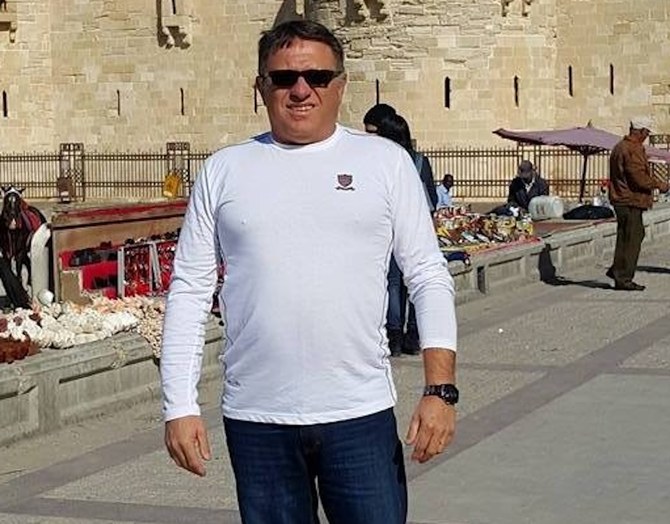
- Security sources made no link between the shooting and the dead man’s ethnic background
CAIRO: Egypt’s interior ministry said it had launched an investigation Wednesday after an Israeli-Canadian businessman was shot dead in the coastal city of Alexandria.
A police statement said the man, “a permanent resident of the country” was shot dead on Tuesday.
The Israeli foreign ministry said the murdered man was a businessman with dual Canadian-Israeli citizenship.
“He had a business in Egypt. The Israeli embassy in Cairo is in contact with the Egyptian authorities, who are investigating the circumstances of the case,” the ministry said.
Attacks on Israelis in Egypt are rare but not unprecedented.
On October 8, the day after Hamas attacked Israel triggering war in Gaza, an Egyptian policeman shot dead two Israeli tourists and their Egyptian guide.
Following their deaths, Israeli authorities advised its nationals in Egypt to leave “as soon as possible.”
Egypt was the first Arab country to sign a peace treaty with Israel but relations between the two peoples have never been warm.
The Egyptian government has often acted as mediator in flare-ups in the Israeli-Palestinian conflict that have threatened to stir up passions on the street.
Israel pounds Gaza as truce talks resume in Cairo
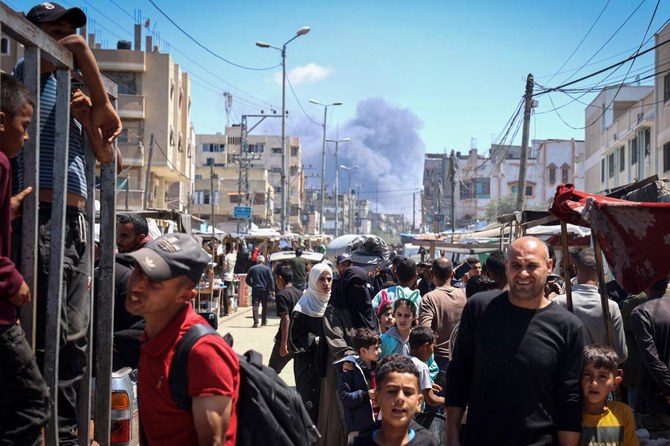
- AlQahera News: ‘Truce negotiations have resumed in Cairo today with all sides present’
- Moscow so far sees no prospect for a peace settlement in Gaza or the wider Middle East
RAFAH, Palestinian Territories: Israel bombarded the overcrowded Gaza city of Rafah, where it has launched a ground incursion, as talks resumed Wednesday in Cairo aimed at agreeing the terms of a truce in the seven-month war.
Despite international objections, Israel sent tanks into Rafah on Tuesday and seized the nearby crossing into Egypt that is the main conduit for aid into the besieged Palestinian territory.
The White House condemned the interruption to humanitarian deliveries, with a senior US official later revealing Washington had paused a shipment of bombs last week after Israel failed to address US concerns over its Rafah plans.
The Israeli military said hours later it was reopening another major aid crossing into Gaza, Kerem Shalom, as well as the Erez crossing.
But the UN agency for Palestinian refugees, UNRWA, said the Kerem Shalom crossing — which Israel shut after a rocket attack killed four soldiers on Sunday — remained closed.
It came after a night of heavy Israeli strikes and shelling across Gaza. AFPTV footage showed Palestinians scrambling in the dark to pull survivors, bloodied and caked in dust, out from under the rubble of a Rafah building.
Russia said on Wednesday that the war in Gaza was escalating due to Israel’s incursion into Rafah and that Moscow so far saw no prospect for a peace settlement in Gaza or the wider Middle East.
“An additional destabilizing factor, including for the entire region, was the launch of an Israeli military ground operation in Rafah,” Russian Foreign Ministry Spokeswoman Maria Zakharova told reporters.
“About one and a half million Palestinian civilians are concentrated there. In this regard, we demand strict compliance with the provisions of international humanitarian law.”
Speaking more broadly about efforts to find a lasting settlement in the Middle East, Zakharova said: “I would like to call it a settlement, but, alas, it is far from a settlement.”
“There are no prospects for resolving the situation in the Gaza Strip. On the contrary, the situation in the conflict zone is escalating daily.”
“We are living in Rafah in extreme fear and endless anxiety as the occupation army keeps firing artillery shells indiscriminately,” said Muhanad Ahmad Qishta, 29.
“Rafah is a witnessing a very large displacement, as places the Israeli army claims to be safe are also being bombed,” he said.
The Gaza war was sparked by Hamas’s unprecedented October 7 attack on Israel, which resulted in the deaths of more than 1,170 people, mostly civilians, according to an AFP tally of Israeli official figures.
Israel in response vowed to crush Hamas and launched a military offensive that has killed at least 34,789 people in Gaza, mostly women and children, according to the Hamas-run territory’s health ministry.
Militants also took around 250 people hostage, of whom Israel estimates 128 remain in Gaza, including 36 who are believed to be dead.
Talks aimed at agreeing a ceasefire resumed in Cairo on Wednesday “in the presence of all parties,” Egyptian media reported.
A senior Hamas official said the latest round of negotiations would be “decisive.”
“The resistance insists on the rightful demands of its people and will not give up any of our people’s rights,” he said on condition of anonymity because he was not authorized to speak publicly on the negotiations.
The official had previously warned it would be Israel’s “last chance” to free the scores of hostages still in militants’ hands.
Mediators have failed to broker a new truce since a week-long ceasefire in November saw 105 hostages freed, the Israelis among them in exchange for Palestinian prisoners held by Israel.
Mediator Qatar urges international community to prevent Rafah ‘genocide’
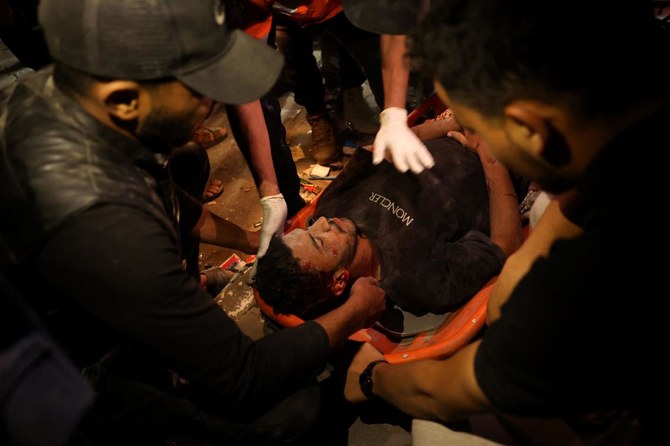
- Israel struck targets in the Gaza Strip on Wednesday after seizing the main border crossing with Egypt
- African Union condemns the Israeli military’s moves into southern Gaza’s Rafah
DOHA: Qatar called on the international community on Wednesday to prevent a “genocide” in Rafah following Israel’s seizure of the Gaza city’s crossing with Egypt and threats of a wider assault.
In a statement the Gulf state, which has been mediating between Israel and militant group Hamas, appealed “for urgent international action to prevent the city from being invaded and a crime of genocide being committed.”
Israel struck targets in the Gaza Strip on Wednesday after seizing the main border crossing with Egypt. Israel has vowed for weeks to launch a ground incursion into Rafah, despite a clamour of international objection.
The attacks on the southern city, which is packed with displaced civilians, came as negotiators and mediators met in Cairo to try to hammer out a hostage-release and truce deal in the seven-month war.
Qatar, which has hosted Hamas’s political office in Doha since 2012, has been engaged — along with Egypt and the United States — in months of behind-the-scenes mediation between Israel and the Palestinian group.
The African Union condemned Wednesday the Israeli military’s moves into southern Gaza’s Rafah, calling for the international community to stop “this deadly escalation” of the war.
AU Commission chief Moussa Faki Mahamat “firmly condemns the extension of this war to the Rafah crossing,” said a statement after Israeli tanks captured the key corridor for humanitarian aid into the besieged Palestinian territory.
Faki “expresses his extreme concern at the war undertaken by Israel in Gaza which results, at every moment, in massive deaths and systematic destruction of the conditions of human life,” the statement said.
“He calls on the entire international community to effectively coordinate collective action to stop this deadly escalation.”
Israel says it has reopened Kerem Shalom border crossing for Gaza aid
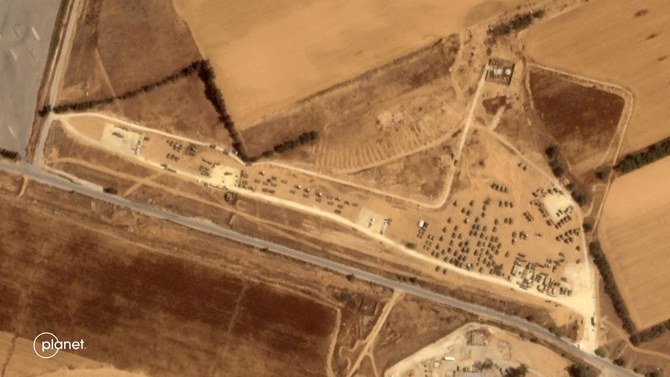
- Erez border crossing between Israel and northern Gaza is also open for aid deliveries into the Palestinian territory
JERUSALEM: Israel said it reopened the Kerem Shalom border crossing to humanitarian aid for Gaza Wednesday, four days after closing it in response to a rocket attack that killed four soldiers.
“Trucks from Egypt carrying humanitarian aid, including food, water, shelter equipment, medicine and medical equipment donated by the international community are already arriving at the crossing,” the army said in a joint statement with COGAT, the defense ministry body that oversees Palestinian civil affairs.
The supplies will be transferred to the Gaza side of the crossing after undergoing inspection, it added.
The statement said the Erez border crossing between Israel and northern Gaza is also open for aid deliveries into the Palestinian territory.
The Kerem Shalom crossing was closed after a Hamas rocket attack killed four soldiers and wounded more than a dozen on Sunday.
On Tuesday, Israeli troops seized control of the Palestinian side of the Rafah crossing between Gaza and Egypt after launching an incursion into the eastern sector of the city.
The United Nations and Israel’s staunchest ally the United States both condemned the closure of the two crossings which are a lifeline for civilians facing looming famine.



